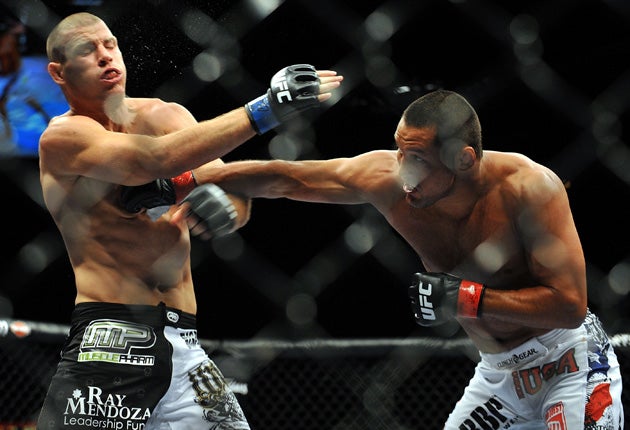UFC: Clitheroe Kid flunks shot at bonanza
Britain's best mixed martial artist has taken a heavy blow in a sport redefining the fight game. Guy Adams reports from Las Vegas

A fresh chapter in the history book of British fighters whose grandest ambitions turn to dust in Las Vegas was written late on Saturday, when one of our nation's most feted came, saw and was comprehensively conquered beneath the bright lights of his sport's biggest stage.
More than 300 million, in 76 countries, watched a showdown that had transfixed prizefighting's first city, notching up 1.2 million $45 (£28) pay-per-view sales in the US, and helping a pair of ringside tickets to the Mandalay Bay's sold-out arena change hands for a recession-busting $45,000. Yet when the hopes of travelling British fans were dashed, it wasn't a plucky Ricky Hatton or Frank Bruno smeared indignantly across the canvas. And they weren't looking out across one of the floodlit boxing rings that have for years hosted combat sport's greatest match-ups.
Instead, the unfortunate fighter knocked clean out, one and a half rounds into the biggest fight of his career, was a 30-year-old former carpet fitter from Clitheroe called Michael Bisping. And the scene of his demise was an eight-sided cage described as "The Octagon".
Bisping is Britain's leading mixed martial artist. And on Saturday, his middleweight battle with Dan Henderson was one of the top draws at UFC 100, a totemic milestone in the extraordinary evolution of "MMA" from blood-and-sawdust freak show into a mainstream sport.
In a little over a decade, the pursuit once known as cage-fighting has morphed into a staggeringly popular test of athleticism, skill and raw brutality. It marries the best of ju-jitsu, Greco-Roman wrestling, tae kwon do, kick-boxing, and traditional boxing – and boasts hundreds of millions of devoted fans. The sport's rise has turned the leading promoter UFC into a multinational company recently estimated by Forbes magazine to be worth $1bn. It is now seen by many sporting pundits as a threat to the future of traditional pugilism.
TV audiences alone helped UFC to make $200m last year, and eight of the 10 most watched pay-per-view events in any sport, including boxing, were promoted by UFC. That's before you even consider advertising: last night's event attracted blue-chip sponsorship from firms such as Budweiser and Harley Davidson, keen to tap into its edgy, young demographic.
The extraordinary growth has made millionaires of fighters like Bisping, who four years ago was sleeping in his car, as he criss-crossed Britain to fight, for tiny purses. Today, he is close to a household name in America, starring in reality TV shows, video games.
Yet commercial success counts for nothing when you're forced to go toe to toe over three five-minute rounds against Henderson, a two-time US Olympic Greco-Roman wrestler who is regarded as one of the legendary figures in mixed martial arts.
Bisping came into the bout with a career record of 17 wins and just one loss, but with a question mark over his ability to handle top calibre opponents. Victory would have teed up a world middleweight title fight on his home turf of the MEN arena in Manchester, against Brazil's Anderson Silva, widely regarded as the world's best pound-for-pound fighter.
Bisping also came with a plan. He wanted to avoid being drawn into a wrestling match with Henderson, an acknowledged master of that art, and instead hide behind his precise left hand and nimble defensive work to jab his way to a points victory.
But from the opening bell he looked nervy and in danger of being swamped. And after taking a few ominous shots in the first round, he walked into a haymaker of a right hook that rendered him instantly unconscious after three minutes 20 seconds of the second.
It was followed, in the moments after he'd crashed to the blood-soaked canvas, by another right to the jaw, which had all of Henderson's 185lb behind it. After the referee had stopped the fight, Bisping lay on his back, immobile for a worrying two minutes. He ended the night being rushed to hospital for a CAT scan and, in some quarters, his opponent's eagerness to deliver the potentially dangerous and unnecessary second blow attracted fierce criticism.
Bisping's colourful jibes had succeeded in publicly riling Henderson in the run-up to the fight. After his victory, the American admitted: "I know when a fighter's out. I knew he was out when I [first] hit him. That [second punch] one was just to shut him up a bit."
The Canadian Georges St-Pierre kept his welterweight title on points after a technical masterclass against Brazilian Thiago Alves. Brock Lesnar, a former WWE wrestler, showing his mastery of the heavyweights, gave a textbook display of savage thuggery to stop Frank Mir a minute and a half into the second round.
Fighting talk: A brief history of UFC
*The Ultimate Fighting Championship is an American martial arts organisation. The championship began as a single, no-holds-barred tournament, designed to distinguish the world's best fighters, incorporating the disciplines of wrestling, karate, boxing, kick-boxing and ju-jitsu.
*Advertising executive Art Davie was inspired to propose an eight-man event in 1992 after a meeting with the Brazilian martial artist Rorion Gracie. The first event took place in Denver in November 1993.Eighty-seven thousand viewers subscribed on ppv as Royce Gracie, Rorion's brother, won.
*Criticism of the violence of the sport from Senator John McCain and the resultant loss of TV coverage led to the sport being reformed in the late 1990s. An overhaul of the rules, TV deals with Fox Sports and a reality spin-off, Ultimate Fighter, increased UFC's profile. It is now shown in 36 countries and computer games and action figures have been released.
James Mariner
Join our commenting forum
Join thought-provoking conversations, follow other Independent readers and see their replies
Comments
Bookmark popover
Removed from bookmarks